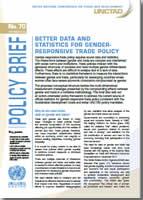
Gender-responsive trade policy requires sound data and statistics.
The interactions between gender and trade are complex and intertwined with social norms and institutions. Trade policies interact with the gendered structures of societies and have multiple gender-differentiated effects.
These effects are difficult to analyse due to a lack of data. Furthermore, there is no statistical framework to measure the interactions between gender and trade, particularly for developing countries where women often face severe economic constraints compounded by gender.
The proposed conceptual structure tackles the multi-dimensional measurement challenges presented by the compounding effects between gender and trade in a cohesive methodology.
This brief also sets out an action-orientated policy framework to address the current lacuna of official statistics for gender-responsive trade policy consistent with the Sustainable Development Goals and wider UNCTAD policy mandates.
Key points:
-
Governments are committed to using trade to foster gender equality and women’s economic empowerment.
-
Lack of data on complex interactions of gender and trade is holding back progress.
-
UNCTAD calls for collaboration to develop official statistics in support of gender-responsive trade policy.


